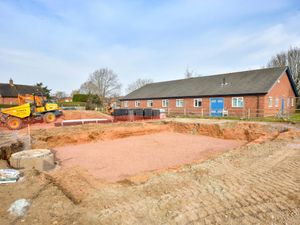Quick-thinking farmer acts fast to create firebreak and prevent combine blaze disaster
A Shropshire farmer had to create an emergency firebreak to stop a combine harvester blaze from destroying his whole crop and threatening his family home.
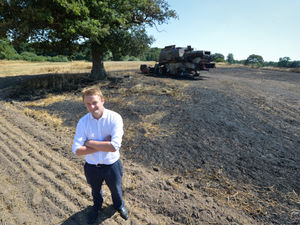
Tim Ashton from Soulton Hall near Wem realised he had to sacrifice the vehicle to the fire to prevent a major disaster on the farm.
His was among a spate of agricultural vehicle fires in the county during the dry weather with no less than six on Wednesday involving combine harvesters and a seventh an agricultural trailer.
Tim says the fast response from emergency services proved how vital it was to retain and improve their funding.
He raised the alarm after realising he could not put out the fire in the vehicle's engine compartment.
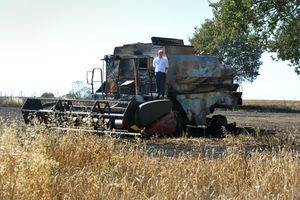
"I went through all the cleaning and safety measures before starting the combine but had only gone a couple of times around the field before I couldn't get it into reverse. I looked in the engine, saw the problem and reached for the fire extinguisher.
"It was after using the second extinguisher that I realised I was not going to save the machine and had to stop the fire spreading."
He ran for his mechanical digger to flatten part of the crop to create a fire break.
"My neighbour, Anthony Ford realised what was happening and with his tractor began ploughing in the wheat behind me," he said.
"His swift action meant we were able to create that fire break needed in the time while the fire service mobilised. Shropshire Fire and Rescue Service was outstanding.
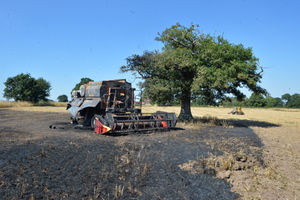
"Yes we have lost the combine harvester and about 10 square metres of wheat. But if the blaze had spread through the crop to Soulton Hall, which is a heritage building, it could have been catastrophic.
"We have a 1,000 litre water bowser available but I very quickly realised that sacrificing the combine to save the crop and our home was the only thing to do."
"This year has been unprecedented weather wise. Anyone who still denies climate change really has to take a look at what it happening."
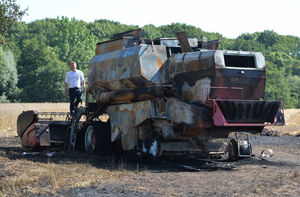
On Wednesday Shropshire Fire and Rescue Service also dealt with fires in combine harvesters at Upper Edgebold, Much Wenlock, Bridgnorth, Eaton-on-Tern and Hodnet and an agricultural vehicle fire in Telford.
There is an “exceptional” risk of wildfires as an amber heat warming comes into place, experts are warning.
The Met Office has raised the Fire Severity Index to very high for the West Midlands while the Fire Brigade Union has warned the next few days could be deadly as temperatures soar with more wildfires feared.
Fire Brigade Union representative for the Midlands Kevin Bough said: “It could be really dangerous. Wildfires in fields are a lot more dangerous for firefighters because there is a lot less water around than in the city.”
He claimed numbers of firefighters had been reduced substantially in the last decade and were in danger of being overstretched, a claim disputed by West Midlands Fire Service.
Riccardo La Torre, national officer for the Fire Brigades Union, has warned that services across the UK are completely unprepared for the level of risk posed by the imminent heatwave.
Mr La Torre said: “These are brutal, brutal fires to fight. The temperature that they burn at, the speed at which they spread.
“The reality is we’ve been left completely unprepared to do that as a fire and rescue service.
“We’ve had over a fifth of the workforce cut since 2010, that’s over 11,500 firefighters cut. Yet we’re asking them to deal with these extreme weather events in increasing regularity and increasing severity.
“The professionals on the ground have been warning that these conditions are coming and we very much saw the reality of that in these last few weeks.
“Firefighters have been injured, firefighters have ended up in hospital, we’ve seen families lose their homes, we’ve seen businesses lost, infrastructure burn to the ground, because we simply can’t get to these fires quick enough.
“When we do, we simply don’t have the resources to deal with them adequately.”
The Met Office has issued an amber heat warning running until Sunday, which could see temperatures peak at 33C (91F) across the West Midlands.
Met Officer meteologist, Mr Marco Petagna said: “I think the hottest day will probably be Saturday, where we could see 36C in one or two spots in the south."
There is also a heat health alert in place from the UK Health Security Agency, with experts advising people to look out for those who are older or with existing health conditions, as well as young children.
He said rain could be on the horizon early next week, with showers likely in the West Midlands on Monday.
“There are signs that we could get some rain next week, but details at the moment are uncertain,” he said.
“What we really need is a few weeks of light rain to soak into the ground,” he said.
“Thunderstorms are more likely to cause some flooding issues because the ground is hard the water can’t sink in.”




